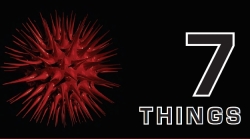An oncologist gives us his lifestyle tips that will help you avoid developing the disease
Most of us will know someone within our circle of family and friends who has been touched by cancer. There is a great deal of curiosity these days about how a person’s lifestyle and habits impact on the risk of developing the condition, with many remaining confused about whether they are doing the right thing to minimise their risk. This confusion is not altogether surprising, as one week there will be a study that discusses the benefits of red wine on health, which will be followed by another that links alcohol consumption to an enhanced risk of breast cancer.
Ambivalent information tends to create more questions than give answers, but there are nevertheless a number of strong recommendations that I would give as a cancer specialist to help people minimise their risk of developing the illness.
A disease like cancer continues to be a major challenge for clinicians and researchers alike and although there is no guaranteed and fool-proof check list possible for its avoidance, these seven suggestions can certainly help minimise one’s risk.
Finally, one should try to lead a balanced life that includes physical activity. Stress in one form or another, is unavoidable in our daily lives, but nevertheless should be minimised. Social interaction with family and friends goes a long way to engender a feeling of well-being, which is thought to protect against the risk of developing cancer. Burnt and reheated meat has been found to enhance the risk of various types of cancers in several studies and therefore should be avoided. Also, take care not to consume very hot liquids, as they can damage the inner lining of the stomach and lead to acid reflux, commonly known as heart burn. This sensation is caused when gastric juices enter the oesophagus, the pipe that leads into the stomach. Unfortunately, the oesophagus lacks the protective lining that the stomach has and repeated exposure to stomach acid has been linked with oesophageal cancer, a disease that has limited treatment success.Protect yourself from direct exposure to sunlight. Sunbathing has been found to be the leading cause of skin cancer and prolonged exposure to the sun without adequate sun protection lotions is highly dangerous. Tanning salons that use chemicals to induce tans are not recommended at all, as these are also potentially very risky.Quit smoking. If you are a smoker, the single biggest thing that you can do to minimise your and your family’s risk for a large number of potential cancers is to give up smoking immediately. This is quite simply a no brainer. Giving up smoking is the most important positive change you can make in your life. If you are not a smoker, please do not even think about taking up smoking as a habit, even just for social outings. For my Asian compatriots, say no to pan masala. Pan masala is by far the leading cause of head and neck (oral) cancers in many countries around the sub-continent of India. For the uninitiated, pan masala is a mixture of spices and other ingredients, such as cardamom, lime, menthol betel nuts and is also sometimes mixed with tobacco. With or without tobacco, pan masala has been shown in studies to be related to a high degree of cancer. Jazzy advertising campaigns that some pan masala manufacturers undertook in earlier years encouraged the middle classes (and indeed some pretty affluent industrialists) to take up the habit of chewing the substance. A very large number of these people are now paying the price by acquiring a deadly disease into the bargain. Eat regular portions of fruit and vegetables and drink tea, as naturally occurring compounds called flavanoids are present in these foodstuffs and these have been found to have a positive impact on reducing the risk of developing cancer, even reducing lung cancer among smokers (although quitting is by far the most effective way of reducing the risk). Strawberries, green and black teas, brussel sprouts, apples, beans and broccoli are good sources of flavanoids. A vegetarian diet has been found to be linked to a reduced risk of cancer and a diet high in meat (especially red meat) has been found to be behind a number of different types of cancer, including colorectal cancer. If the nature of your job involves you coming into contact with chemicals or substances that are deemed to be harmful, ensure that you are well protected and avoid excessive exposure to these, as many industrial solvents and liquids are known to cause cancer. Such exposure may be through direct contact of the chemicals against the skin, or inhalation of toxic fumes and vapours. Your employer has an obligation to provide you with the necessary clothing and equipment for keeping you safe and for ensuring that your work environment is well ventilated. It is your right to be safe in your work place.




